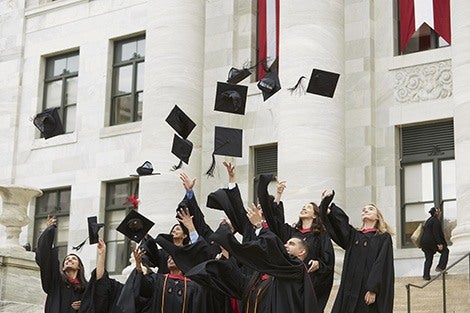May 23, 2018 – Collaboration has been key in addressing public health challenges of the past, such as polio, and it will continue to be key for today’s challenges, such as gun violence, said Michelle Williams, Dean of Harvard T.H. Chan School of Public Health, at the Convocation ceremony celebrating 2018 graduates.
“Public health has always been about hunting in packs,” she told students and their families gathered under a big tent on the Harvard Medical School (HMS) Quadrangle. By working together, “we can achieve things no biostatistician or epidemiologist, no policy analyst or social scientist, no immunologist or geneticist—no expert or activist—could ever do alone.”
Mary Robinson, former president of Ireland and former U.N. High Commissioner for Human Rights, was the keynote speaker. “You are graduating at a time of deep uncertainty but of great potential for a better future,” Robinson told students. Offering an overview of two current public health challenges—climate change and the lack of universal health coverage in the U.S.— she said that students have “the talent, the training, the commitment, and the expertise to meet the challenges ahead.”
On a warm, sunlit day, 663 students gathered to celebrate their achievements. The HMS Quad provided a new venue for the event, which has been held in the past in the Kresge Quad. The new location provided much more space for students, families, and guests. In addition, the Harvard Chan School ceremony—held on Wednesday instead of the traditional Thursday—was renamed a “convocation” instead of “commencement” in recognition of the fact that Harvard University doesn’t officially confer degrees until Thursday’s Commencement exercises in Cambridge.
Among the students there were 41 Doctors of Philosophy, 25 Doctors of Public Health, 62 Doctors of Science, 28 Masters in Health Care Management, 399 Masters of Public Health, 101 Masters of Science, and 7 Masters of Arts. Graduates came from 64 countries and 39 U.S. states plus the District of Columbia.
At a reception the evening before Convocation, awards were presented to 14 graduating students, nine faculty, and four staff members.
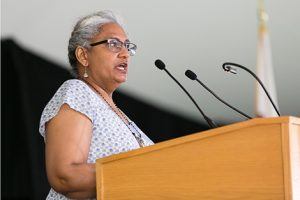
‘Native space’
Elizabeth Solomon, assistant director of academic affairs and fellowship programs for Harvard Chan School’s Department of Social and Behavioral Sciences and a member of the Massachusett Tribe at Ponkapoag, opened Convocation with an acknowledgment of native land and peoples. She spoke of the losses that Native Americans suffered, both in lives and land, with the coming of colonists to the Americas several hundred years ago. But, she said, “For thousands of years, my people have been a part of this place. We belong to this place, and alterations to the landscape cannot change this.”
Solomon spoke of the importance of honoring native land. “I ask you to remember that wherever you are in the Americas, you are in native space, and that there are indigenous people who belong to that place,” she said.
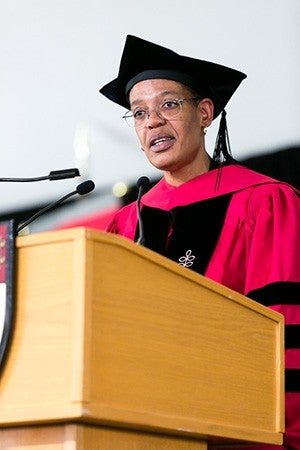
Gathering force
To illustrate the importance of collaboration, Williams cited examples of how public health advancements by single individuals gathered force when they became large-scale efforts involving many people.
In the 1920s, Philip Drinker, then a young assistant professor at the Harvard School of Public Health, invented the Drinker respirator, now known as the Iron Lung, to help polio-stricken children breathe. Two decades later, Thomas Weller, later to become a professor at the School, unlocked the ability to grow poliovirus in a lab—which in turn enabled Jonas Salk and Albert Bruce Sabin to develop a polio vaccine.
But financing for the vaccine came from the March of Dimes—a national fundraising project and social movement begun by President Franklin D. Roosevelt, which collected dimes or other small amounts of money from millions of people to help fight polio, Williams said.
Williams also talked about Harvard Chan School graduate Donald Hopkins’ central role in fighting Guinea worm disease. At its height, the disease afflicted 3.5 million people; as of 2017, there were only 26 people with the disease worldwide. “But Don Hopkins would be the first to tell you that he alone did not take down Guinea worm,” Williams said, noting that there were many others who aided the effort, including public health officials, doctors, human rights advocates, African ministers of health, and companies that donated larvicide to kill Guinea worm-laden water fleas and nylon for water filtering.
Events of the past year have shown that it’s still possible to marshal collective action to address a public health challenge, Williams said. “After the shooting at Marjory Stoneman Douglas High School in Parkland, Florida, a few brave students chose to speak out, and they ignited a massive public health movement,” she said. “After a few courageous women spoke out … about the abuse they faced in Hollywood, millions of women have followed and are taking on their abusers and their enablers and shouting out those words, harrowing and empowering are they are: ‘Me too.’ ”
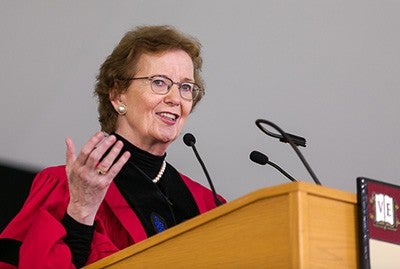
Two big challenges
Robinson, who is president of the Mary Robinson Foundation–Climate Justice, spoke about the great challenge in stabilizing the climate. “If we continue with business as usual we are on track to at least a 3.5°C warmer world compared with pre-industrial levels,” she said. “This would lead to extreme and potentially irreversible impacts on natural ecosystems and on human health. Basically, it would be catastrophic, and that is what we are headed for unless we can bend the curve and change.”
A warming world would disproportionately affect people living in vulnerable situations due to geography, gender, age, race, poverty, disability, or social status, Robinson said. “It is an injustice that the people who have contributed least to the causes of the problem suffer the worst impacts of climate change,” she said.
Harm to human health from climate change could come in the form of heat, droughts, floods, and more intense storms, as well as from the spread of disease vectors, undernutrition because of diminished food production in poor regions, and mental illness, Robinson said.
Robinson also spoke of the failure of the U.S. to achieve universal health coverage (UHC). Noting that promoting UHC is a top priority for The Elders, a group of independent former leaders of which she is a member, Robinson said, “We believe that health is a human right, and that no one should be denied that right or forced into poverty to access the healthcare they need.” The fact that 28 million Americans don’t have any health insurance coverage “is a national scandal,” she said.
She added, though, that she believes that “despite the hyper-partisan arguments in Washington, momentum for universal health coverage is unstoppable in the United States.”
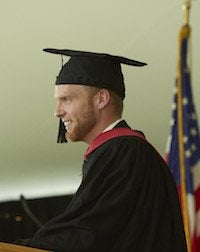
‘Stand up, speak up’
The student speaker was Jamison Langguth, who is receiving an MPH in health management. As a white man, Langguth said, he realizes that he has benefited from “an unearned privilege, which is not true for everyone.” He said he believes that segregation “is the public health issue of our time. It is a large part as to why Flint, Michigan still does not have clean water.” Inequitable patterns of power and powerlessness exist around the world, he told his classmates. “We didn’t come here to aid and abet the status quo, but to become leaders who will stand up, speak up, and help empower people who have been denied a platform,” he said.

Preparing for ‘culture shock’
Harvard Chan School Alumni Association President M. Rashad Massoud, MPH ’93, a physician and public health specialist, welcomed graduates to the alumni community. Massoud currently serves as director of the USAID Applying Science to Strengthen and Improve Systems Project and is senior vice president of the Quality and Performance Institute at University Research Company, an international organization that provides solutions to health and social challenges worldwide.
Massoud recalled being warned in 1992 about “culture shock”—not from coming to America from Palestine, but from arriving at Harvard, where he was about to begin his MPH program. But Massoud, who was at the School along with his wife, said they both loved their experience. “Time flew by, and the next thing I knew, I was graduating,” he said.
He did feel culture shock, though, when he headed back home to Palestine after graduation. He told students to be prepared for it as well when they return to their own home countries. “It comes when you go back to work and find that although you may have moved light years ahead because of the incredible education you got here at the School, back at work everything may be pretty much the same as you left it,” he said. “In fact, it could even be exactly where you left it.”
He told students, however, that Harvard Chan School has prepared them well for the evolving public health landscape. “The world needs you. It needs the new thinking, the methods, the skills, the tools you have learned here,” he said.
photos: Kent Dayton, J.D. Levine
Additional coverage
Convocation 2018 photo gallery
Commencement 2018 photo gallery
Commencement 2018 slide show
Commencement and Convocation 2018 videos
Commencement 2018: Award winners
Commencement 2018 Awards photo gallery
Dean Michelle Williams address
Former President of Ireland and former U.N. High Commissioner for Human Rights Mary Robinson address
Student speaker Jamison Langguth address
Alumni Council President M. Rashad Massoud address
